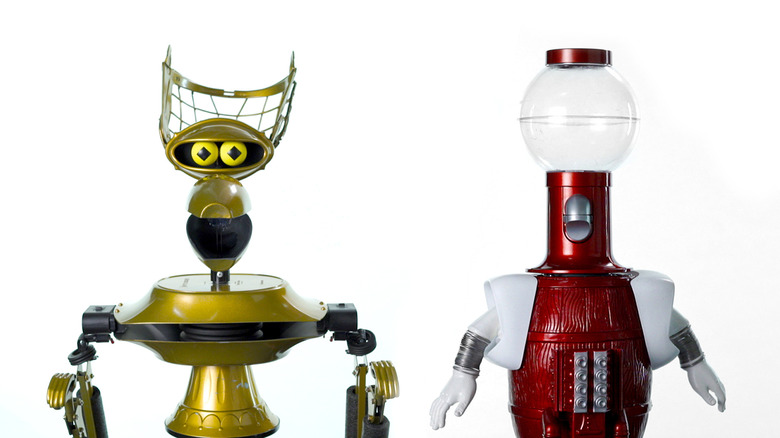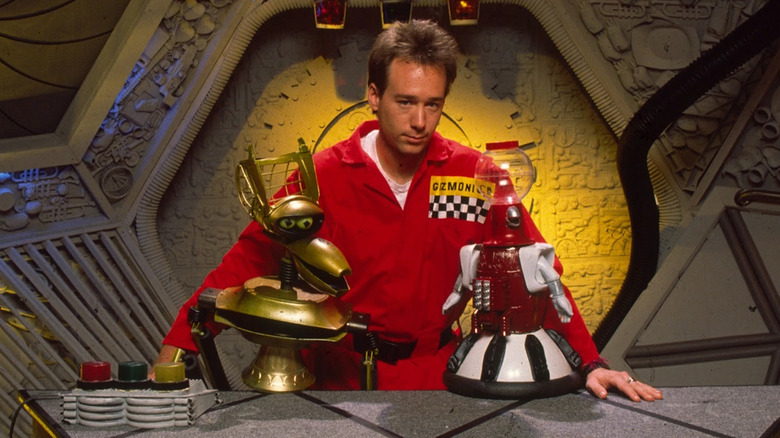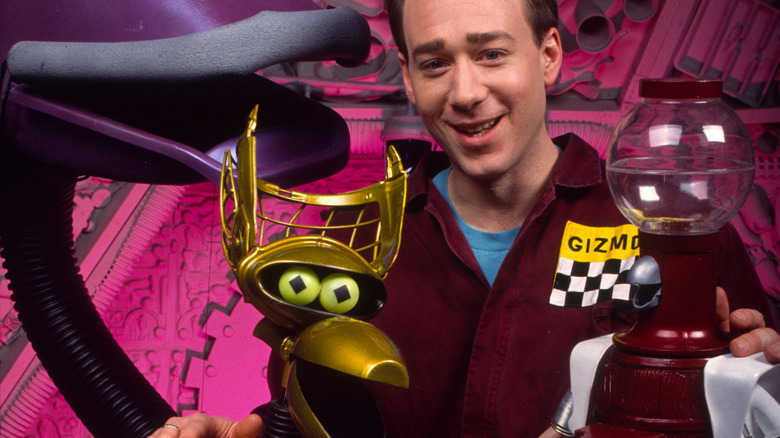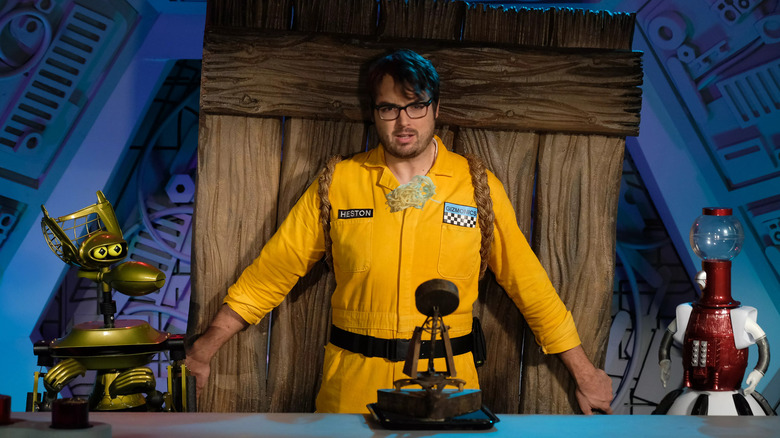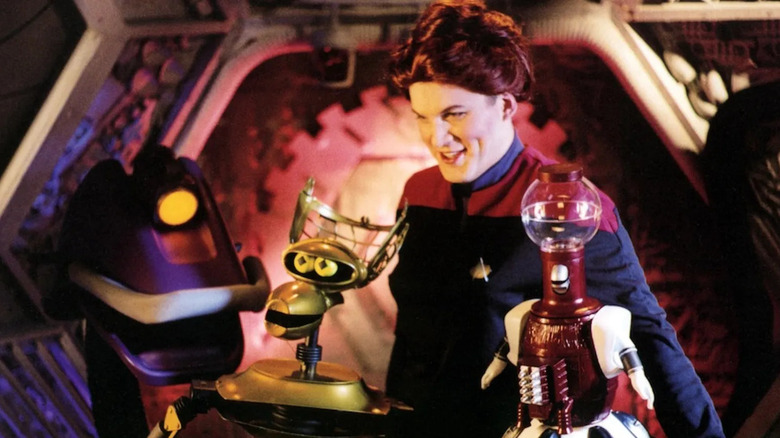The Mystery Science Theater 3000 Robots Are Quintessential Gen-Xers
It is necessary to preface this article with the understanding that delineations between popularly named generations are an abundantly arbitrary process, and the generation to which an individual ally themselves — if they even care to do so — is going to be completely at their own discretion. That said, certain age groups in every country are going to have — in a broad sense — shared experiences that may speak to their identities. And that's all that can really be said about "generations," as they have come to be discussed in scads of online articles scratched out by amateur sociologists everywhere.
Several years ago, according to endless op-ed pieces in just about every high-profile publication, Millennials all became vicious serial killers. There was no industry they wouldn't kill, from golf, to Hooters, to homeownership. Nothing was safe from the great 2017 Millennial non-buying spree. It's almost like a dramatically-shifted financial landscape, along with an evolving set of values, changed what people were buying and what they could afford. Post-college Millennials were treated to the gift of "hustle culture" and the gig economy, which dictated that having multiple jobs and working seven days a week was merely the norm and a great way to prove your tenacity to bosses that would eventually (and assuredly, right?) promote you. Meanwhile, aging Baby Boomers — disgusted by the Millennial killing spree — clung to the old-world Horatio Alger success stories that working hard and abstaining from avocado toast is the path to success. Boomers gave Millennials so much crap for their distracted phone use, their refusal to marry, and, horror of horror, their queerness. Millennials answered in kind with a dismissive "OK boomer," and proceeded to point out the economic and environmental wasteland Boomers handed them.
Sitting sarcastically in the middle of the fray — only occasionally interjecting with a sardonic quip and a dismissive gesture — was Generation X, insufferable CD-buying, record industry-bolstering, VHS-obsessed weirdos whose cynicism about the world calcified sometime in the early 1990s, and whose widespread habit of deconstructionism belied a general withdraw in disgust. But, as Richard once said: Withdrawing in disgust is not the same thing as apathy. Yes, I just made a reference to a 1994 R.E.M. song that was, in turn, making a reference to the 1990 movie "Slacker." And it's that tendency to make reference that gets to the loose thesis of this article: That making pop references, and seeing the world sarcastically through a lens of haphazardly curated media cues is perhaps (if one wants to use such general terms) one of the defining features of Generation X. And when it came to making pop references and seeing the world sarcastically through a lens of haphazardly curated media cues, Generation X had two exemplars that represented them to a T: Crow T. Robot and Tom Servo from "Mystery Science Theater 3000."
What is MST3K?
A brief rundown: "Mystery Science Theater 3000," or "MST3K," as fans call it, was created in 1988 by standup prop comedian and puppeteer Joel Hodgson, and broadcast on local TV station KTMA before eventually gaining traction and finding a wider-spread audience on Comedy Central throughout the 1990s. Hodgson, born in 1960 and raised on a rich diet of late-night TV, bad movies, and the pop art of his generation, wanted to present a late-night TV program that captured the experience of staying up late with friends and watching whatever bizarre oddities appeared on the cathode ray tube. "MST3K" was based on a now-moribund model of TV that perhaps requires some context in 2022: In the 1970s and 1980s, many local TV stations, eager to fill their airwaves and keep their broadcast going late into the night, would buy up pre-packaged bundles of movies from low-end distribution houses that, in turn, had amassed the dregs of the cinematic landscape from a decade previous. A generation of kids was raised on the random caprices of late-night TV programmers, and, as such, attained a bizarro affection for the garbage that they were consuming. Although the films and TV shows were bad, many people Hodgson's age discovered the fun of "riffing" along to these bad movies, finding value in the valueless.
The premise of "MST3K" is a bit high concept: Joel Robinson (Hodgson) has been kidnapped by a pair of mad scientists and is forced to live in isolation on a satellite orbiting the Earth. The mad scientists sent Joel a string of terrible movies which he would be forced to watch in an effort to drive him mad. Joel, however, built companions out of pieces on the satellite, giving himself a pair of robotic operating buddies he could watch the movies with. Joel and the bots survived the constant onslaught of cinematic trash armed with nothing more than a sardonic sense of humor and a deep, abiding knowledge of pop culture that bordered on the encyclopedic. The show was two hours long and would broadcast an entire movie with the hosts cracking wise in real-time. Occasionally they would be permitted to leave the satellite's movie theater to discuss the film, sometimes neutrally, often in horror and disgust ("I need to wash 'Eegah!' off me!").
"MST3K" spanned several networks, switched hosts a few times (Joel would eventually be replaced by the show's head writer Mike Nelson) spawned a feature film (!), and ran until 1999, before splitting off into several side projects, all based on riffing. Rifftrax, The Film Crew, and Cinematic Titanic were all run by "MST3K" alumni and alumnae. The show would also be briefly revived on Netflix with an all-new cast, and currently operates as a touring live show with its own unique traveling troupe.
But, for the purposes of this article, let's take a closer look at the two central robots on the show: Crow T. Robot and Tom Servo.
The cathode ray tube is the retina of the mind's eye
When looked at from a generational perspective, few shows could exemplify the ethos of Generation X better than "Mystery Science Theater 3000." Generation X was raised on TV. It was arguably the first generation to experience culture through pop media almost exclusively. This can be seen in the entertainment made by Gen-Xers, as when Quentin Tarantino allowed his characters to have an extended conversation about "Like a Virgin" in "Reservoir Dogs," or when a group of zonked-out stoners posited Smurf mating practices in Richard Linklater's "Slacker," or when Dante and Randall wondered about the fate of the people who were in the middle of building the Death Star in "Return of the Jedi" in Kevin Smith's "Clerks." These sorts of conversations were not always common in film. These days, the kind of pop culture overthinking that "Clerks" and "Slacker" presented as comedic is merely a career path.
Much hay has been made of the fact that Generation X was a generation scattered. I am loathe to quote David Fincher's 1999 film "Fight Club" because of its cult of toxic masculinity, but it did rightly point out that Gen-X was a generation without a great war or Great Depression to unite us. As such, we fell back on consumerist complacency and mindless media consumption. Angst was the word of the day, and Gen-X minds could only respond to the world — positively and negatively — with apathy and an emotional vocabulary fed to us directly from the media we consumed. College-educated, afforded few opportunities, and called dumb slackers by Boomers, Gen-X made sarcastic art that dismissed and disposed of culture at large. Consider that the superhero media of the '90s was either clunky garbage like "Batman Forever," or jokey, deconstructionist satires like "The Tick" or "Mystery Men." There wasn't a lot we took very seriously. If you're bored, then you're boring.
Gen-X angst was amplified by the fact that so many of us were college-educated. We were following the Baby Boom belief that a higher education links intrinsically to a desired trade. When trades weren't available, and the only opportunities presented to us were at soulless advertising firms, we became despondent. See "tick, tick... BOOM!" for more.
To return to the subject at hand: Crow T. Robot and Tom Servo are robots. They had no formal education and they had no childhood to speak of. Having been constructed by a media-obsessed, educated Gen-Xer (Hodgson studied media at Bethel University), Crow and Servo had consciousnesses constructed of, essentially, a Gen-X brain media dump. Without a childhood to fall back on — or resentment toward rewarding-but-"impractical" college years wasted on, say, philosophy or poetry — Crow and Servo could only see the world through movies and TV, as they were literally capable of nothing else. The whole of their experience was movies, TV, and what a Gen-Xer told them once. They weren't even born on Earth. In a "Star Trek" sense, Crow and Tom were the first members of a new civilization based on randomly scattered hearsay of Earth media, constructing life lessons from "My Three Sons," Split Enz lyrics, and "Manos, the Hands of Fate."
Culture jamming
All the lessons imparted to Gen-X through reruns and low-budget pop junk pupated in the cybernetic brains of these hysterical plastic puppets, and a mishmash of remixed morality emerged. Using the existence of the band Styx became proof positive of the existence of Hell, while society's rejection of Yahoo Serious was proof of God fighting back evil. Terrible movies were a whetstone on which to sharpen wits and knowledge of the cinematic form. Their pop culture map was constantly being re-drawn, finding connections between Ingmar Bergman, Schlitz commercials, and Pink Floyd.
The brains of Crow T. Robot and Tom Servo were engaged in a practice once referred to as culture jamming, an experimental media practice that involved recutting and remixing extant TV shows in such a way to warp the message and find — of you were in a subversive mood — the real truth. Thanks to a little editing and tweaking, Nancy and Ron were hooked on heroin. Companies like Everything is Terrible!, TV Carnage, and the Church of the SubGenius have been doing this for decades.
Crow and Servo are remixers, jokesters, minor mechanical trickster deities of the Nirvana generation. They are the mascot imps of Gen-X, looking at bad movies and filtering through previous media. And, in an important way, they were critics, watching undeniably terrible movies, and finding value in their place in a larger — and, in time, sillier — cultural topography. They were not critics of individual films, necessarily (although there was plenty of criticism to go around), but self-aware observers of all pop culture, best exemplified through its most vestigial elements. They taught us that bad films have value as comic objects, and that all bad films reflect on the culture at large. Sometimes even better than good films. Popularity is arbitrary, and what we make to entertain one another always possesses an element of absurdity.
If that's not Gen-X, I don't know what is.
Criticism
The sense of humor on "Mystery Science Theater 3000" was reactionary and critical, and has come to be viewed with a great deal of ambivalence over the years. "MST3K" is often cited as popularizing a jokey and dismissive tone to conversations about film, good or bad. Audiences had a good chuckle at the antics of Crow, Tom, Gypsy, Joel, Mike, and all the rest, but they also inadvertently taught the audience that "riffing" for purposes of comedy — that is: turning any and all films into fodder for a comedy "bit" — was an allowable and expected reaction to film. Children of "MST3K" were the likes of mid-2000s online phenomena like "Everything Wrong With..." and "Nostalgia Critic," YouTube sensations who bent over backward to laugh at films without also engaging with them critically. Many have felt the "MST3K" approach to film viewing is a way of staying closed-minded and keeping critical discourse on its most immature level.
I would argue that finding value in something that has been dismissed — something that had been literally consigned to the bottom of a cardboard box in a public TV station in Minnesota — was the real lesson from Crow and Tom, and that making oblique pop culture connections between the high and the low, the sublime and the ridiculous, was the real critical triumph.
Or perhaps evolving attitudes have left the likes of "MST3K" something of a relic. The snarky attitudes and willingness to make a mockery of something that they (rightly) felt deserves to be mocked are a little bit dated these days, relegating "MST3K" to the usual bin of Gen-X nostalgia fodder that infects the landscape like a choking cultural kudzu.
But then — looking at TikTok, Gen-Z, and their willingness to mock Millennials (sample quote I have heard from a member of Gen-Z: "You're not a Hufflepuff. Do a line of coke and grow up") — Crow and Tom may have found a new pocket of winking sarcasm to latch onto. Gen-Z, look back to the antics of plastic robot puppets, and look — really look — at what they have to show you. You may find the twisted minds of Gen-X willing to take you by the hand and teach you how to eat and breathe and other science facts.
